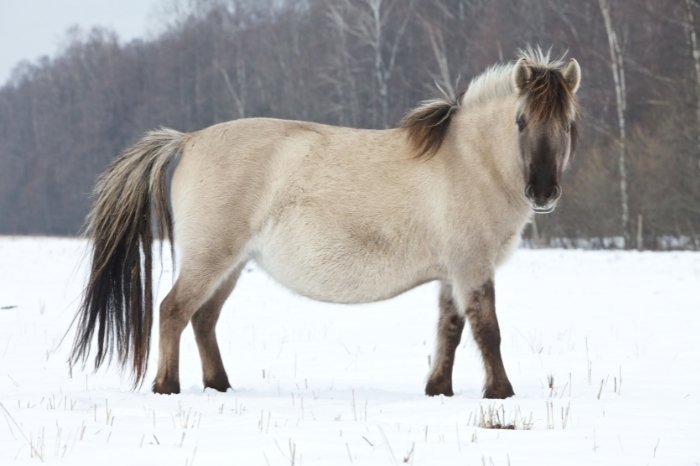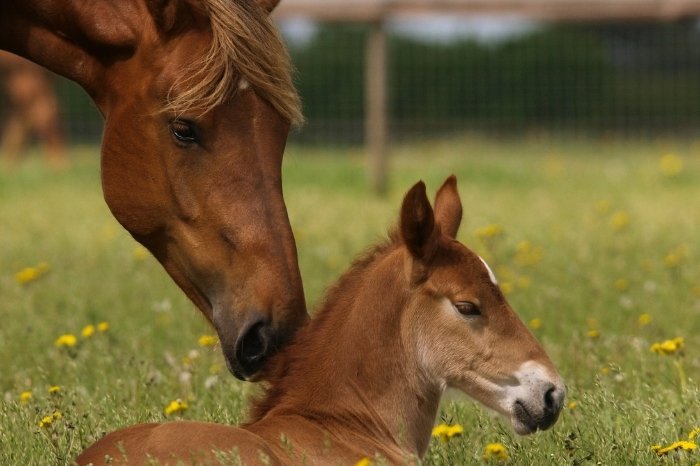Last Updated on July 24, 2022
One of the most adorable baby animals in the world is a foal. So, just how long do horses stay pregnant? Understanding the length of pregnancy and signs of labor in horses can help prepare you if you have bred your horse.
In horses, mares will generally only give birth to one foal a year. Horses should receive proper care throughout their pregnancy to help ensure the birth of a healthy foal. When it comes time for the foal to be born, you want to make sure you have a comfortable, clean set-up for your mare to give birth.
How Long Do Horses Stay Pregnant?
On average, a horse will be pregnant for about 340 days or about 11 months. However, a mare can be pregnant for anywhere from 320 to 370 days or 10 to 12 months.
It is completely normal for a horse to be born within 320 to 370 days of gestation, as gestational periods of mares are more variable than in other animals. This can make it tricky to know when your mare will give birth, but fortunately, most mares will show signs of when they are getting ready to give birth.

If a mare gives birth after 300 to 320 days of pregnancy, there is a high chance that the foal will need neonatal intensive care. However, with the right care, many foals still stand a good chance of survival.
In some cases, a foal might not be born until up to 380 days after gestation. When this happens, the foal is normally fine. However, some foals may be on the smaller side due to delayed uterine development.
Read More About How To Diagnose Heaves In Horses
Checking For Pregnancy – How Long Do Horses Stay Pregnant?
Shortly after a mare is bred, a veterinarian will check if the mare is pregnant. Pregnancy can generally be detected via ultrasound two weeks after breeding.
In addition to an ultrasound, blood and urine testing can be performed two to three months after conception. Alternatively, a veterinarian may be able to a small embryo manually in the mare’s uterus through rectal palpation. This can be performed approximately six weeks into the pregnancy or even earlier.
The earlier a mare is checked for pregnancy, the better it is for her health and her foal’s health. A veterinarian will be able to monitor the mare’s pregnancy, ensuring that the mare has no health complications. In addition, the veterinarian can also monitor the foal to make sure that it has no birth defects.
In the case of twins, an owner and veterinarian may come to the decision to “pinch-off” one embryo, as the pregnancy of twins often has lots of complications. It is very rare for both foals and the mother to survive birth and be healthy.
Care For Mares During Pregnancy
During pregnancy, it is generally best to limit transporting the mare when possible. Pregnant mares should have daily adequate exercise in a paddock or pasture. Mares can also be ridden partially through pregnancy, but it is best to check with your veterinarian first.
Vaccinations and deworming should generally be done before breeding. Then, generally, thirty days before foaling, a mare should get vaccinated for Eastern, Western, and West Nile encephalitis, as well as for tetanus.
For around the first seven to eight months of pregnancy, a mare should generally be fed a routine diet of pasture or hay and concentrate. During the last three months of pregnancy, a mare’s nutrition should gradually increase. This includes good-quality legume or grass hay with a concentrate ration of 12% to 14% protein.
Check Out What Is Cellulitis In Horse Legs?
Signs Of Labor In Horses
A mare can display signs that she is about to give birth up to a few weeks prior to going into labor. The earliest signs a horse is getting ready to give birth are irritability and restlessness.
In the days before foaling, you may notice that your mare is exhibiting enlarged teats. There may also be secretions of milk a couple of days prior and within 12 hours before, a mare may exude colostrum droplets.
Click Here to Get Info About:
Stages Of Labor In Horses
Labor for horses can be divided into three stages. It is important to know the signs of the first stage to know that your horse is beginning to go into labor.
Stage One
In stage one of labor, a horse will likely paw, frequently get up and down, show signs of restlessness, swish her tail, shift her weight and sweat. This is when uterine contractions begin and it can last for several hours.
Stage Two – How Long Do Horses Stay Pregnant?
Stage two begins with the rupture of the chorioallantois, aka the water breaking. During this time, movement of the foal through the pelvic canal begins. The foal will generally be born 10 to 20 minutes after the rupture of the chorioallantois.
Stage Three
Stage three consists of the mare passing the fetal membranes, including the placenta. This should happen within three hours of the foal being born.

Conclusion – How Long Do Horses Stay Pregnant?
In horses, a mare will generally be pregnant for 11 months or 34o days. However, a normal pregnancy can last anywhere from 320-370 days as horses have a variable gestation period.
Do you have any questions regarding how long do horses stay pregnant? If so, please ask any questions regarding gestation in horses in the comments.
FAQ’s
Can a Horse Be Pregnant for 12 Months?
Yes, a horse can be pregnant for up to 12 months. On average, a mare will be pregnant for 11 months, but it is normal for pregnancy to last for 320 to 370 days.
How Many Babies Can a Horse Have?
In a year, a mare can only have one foal, unless she has twins which is very rare and risky. A mare can have up to 16 to 20 foals in her lifetime.
Why Can't Horses Have Twins?
Horses generally don't have twins as there is often not enough room in a horse's uterus for two foals to fully develop. Twins often have many health complications and are under-developed.
Do Horses Give Birth to Twins?
In rare cases, a horse will give birth to twins, but it is not common for both foals and the mare to survive and be healthy. In many cases, a veterinarian will "pinch-off" one embryo to give the mare and one foal a better chance.
